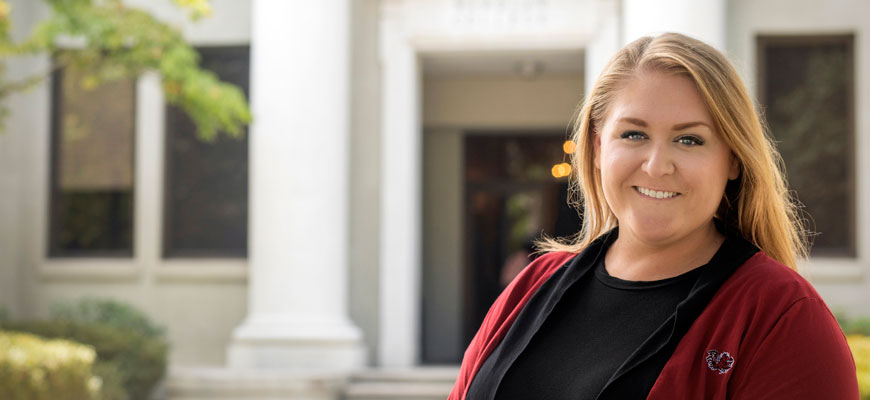
Meet new faculty: Chelsea Stinnett
Posted on: October 24, 2019; Updated on: October 24, 2019
By Megan Sexton, msexton@mailbox.sc.edu, 803-777-1421
Hometown: Dayton, Ohio
Education: B.A., Integrated English and Language Arts Education, Wright State University; M.Ed.,
special education, Wright State; Ph.D., special education, University of South Carolina
Position: Research assistant professor in the educational studies department and director
of CarolinaLIFE, an inclusive certificate college program that supports students with
diverse learning needs, including those with intellectual and developmental disabilities.
How did you get interested in the field?
I was a paraprofessional for two years and a classroom teacher for three in special education. After being in the classroom for five years, I felt like I wasn’t in a position to make any kind of meaningful change to better student outcomes. So I started looking for Ph.D. programs, feeling that could provide me with the platform I needed to learn more about the field and make a meaningful contribution. I found that here at USC. I started as a doctoral fellow and the special education program here at USC supported me for four years. I just completed my Ph.D., and now on to this next adventure as a faculty member and the director of CarolinaLIFE.
What drew you to special education?
I have a family member with a disability. Growing up with that person, sitting through IEP (individualized education program) meetings with my mother and seeing the difference that so many individuals made in that family member’s life, I knew that’s where I was needed to make a difference. That got me interested in the field, but honestly I feel like I didn’t know what the field truly was until I arrived at this point in my career. There is so much to be done in order to best support individuals in discovering how to achieve independence. It’s so much more than one person, teaching in that one classroom. It’s many stakeholders collaborating to support others in achieving their goals.
What was the topic of your dissertation?
I examined how, across the country, postsecondary education programs like CarolinaLIFE support students in building their intimacy knowledge. Intimacy knowledge includes the romantic relationship aspect of intimacy as well as sexual activity. A stigma exists around people with disabilities engaging in intimacy, as if they are incapable or uninterested. Eighty-seven percent of adults with intellectual disability report being sexually active, and they’ve expressed wanting to know more and learn more, yet only 50 percent are receiving sexuality education in high school. Many programs across the country are dipping their toes into supporting students in this area. About 15 percent of college programs never support students in building their intimacy knowledge. Several provide this support reactively based on negative experiences with intimacy. My study was exploratory in nature, but I’d like to further examine the various factors that could contribute to the frequency in which programs are providing support in this area.
What drew you to CarolinaLIFE?
We’re providing an experience for students who thought they’d never be able to go to college. The college experience is so critical to personal and professional development. To be able to live and learn at this institution is just phenomenal for these students who want to experience the same growth and transition as their peers. Our program is rigorous and our students are held to the high expectations that exist in the world of higher education. This was refreshing for me to see, as it is not always the case in the K-12 education system I was coming from. We’re not just providing students with the skills necessary to be successful and independent, but we’re supporting them to be the advocates and the decision-makers in their own lives. We get to see that all come together as they navigate campus life and work toward the future that they want.
Why did you choose South Carolina?
Knowing that inclusion is such a priority within the College of Education and our larger university is something that appealed to me. I wanted a faculty position where I’d also be involved in the administration of a program like CarolinaLIFE. Our program is a nationally recognized, model program. This is a dream job for me because of the quality of the program and the faculty appointment associated with position. Continuing my line of research within this role will not only contribute to the field at large, but it helps inform my own decision-making as a program administrator.
We’re providing an experience for students who thought they’d never be able to go to college. The college experience is so critical to personal and professional development.
Chelsea Stinnett, director of CarolinaLife and research assistant professor
What are you looking forward to this year?
I’m looking forward to making connections with people who were previously my mentors. I have the most supportive people around me who have built me up over the past four years and now I am so fortunate to consider them colleagues. That is very special to me. I’m excited to continue to learn from them while also establishing my own identity as a faculty member.
What do you hope to accomplish in the next five years?
I hope to bring more awareness to the mission of CarolinaLIFE and the effect it has on our campus and Columbia community. I hope to continue to produce research that advances this niche field, particularly moving beyond how we support people with disability becoming employed or living independently and really looking at what makes a person happy. These are critical outcomes, however looking at that social part — making friends, having lasting relationships- there’s so much more to an individual than a job.
What’s a talent or something you do that people might find surprising?
I used to be a singer. I used to perform the national anthem at public venues. I started college at 16 and graduated with my undergraduate degree at 20.